You! You! You!
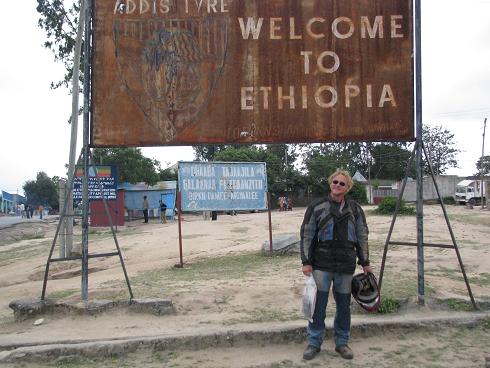
Ethiopia at last
Finally arriving in Moyales we found the town to be as dusty, dirty and tired as we were, yet it was a blessing to find sanctuary at the Catholic Mission where we could erect our trusty tent and bed down for the night.
The TV news of late had been warning of a great famine to rival that of an earlier, more famous, famine in Ethiopia. Visions of dry deserts and suffering all around were filling our heads. Stories from other riders had told tales of excellent roads and spectacular scenery marred by unfriendly Ethiopians hurling rocks, sticks and abuse.
We entered Ethiopia with some trepidation.
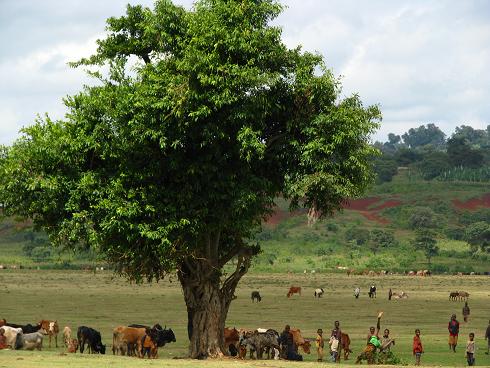
Kids and Cows - such a familiar scene
Completing the immigration and customs formalities and sourcing some gasoline (it is worthy to note that petrol can often be difficult to come by in both the Kenyan and Ethiopian sides of Moyales) and headed off into the heart of the country to discover for ourselves what Ethiopia has to offer.
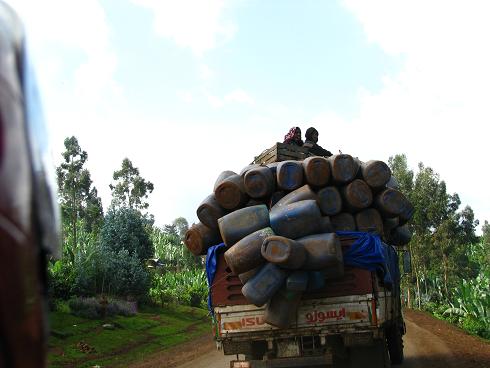
A precariously placed pair
Ethiopia turned out to be a huge surprise.
The pastoral landscape that greeted us as we climbed higher onto the plateau was lush and green., extremely fertile growing many and varied crops. One thing you notice almost immediately, apart from having to drive on the right hand side of the road, is that Ethiopia is an over populated country and that the majority of people walk everywhere.
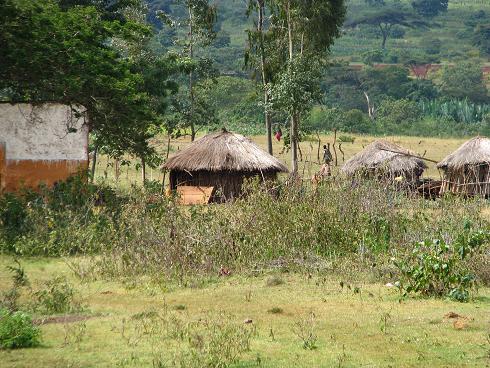
Small Village
As you pass through a village the young men and children scream YOU! YOU! YOU! or Hey farangi! thrusting their faces into your line of vision. Occasionally a F&*% you farangi! is thrown in for good measure.
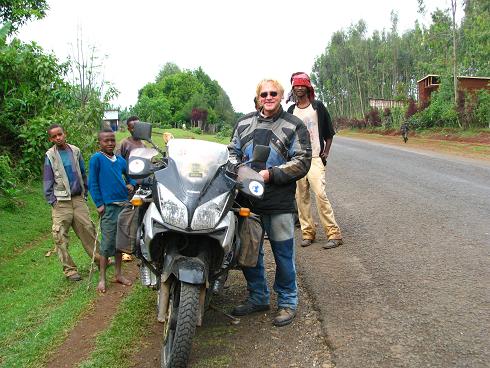
Stop if you dare. Always a curious crowd in Ethiopia
Still reeling from the Nairobi-Moyales road, we took rest and refuge in the city of Awasa, situated on the lake of the same name, at the Chambalamba Hotel owned by the very hospitable Mr Marcos. For two weeks we used the town as a base to rest and refresh after what seemed an eternity of camping .... sometimes you just want your own bathroom and a telly!
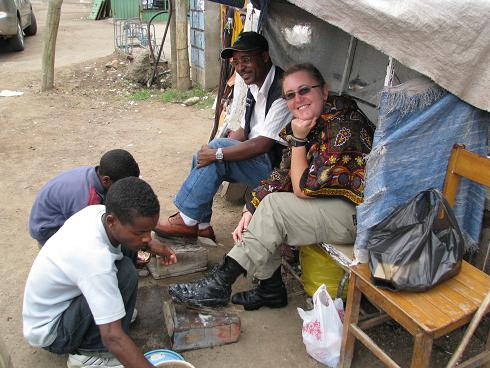
Jules boots get a work over
Grant used this opportunity to look over Miss Piggy to ensure no real damage was caused on the Kenyan Highway 1. A hole in a buckled exhaust, dented cracked bash plate, twisted bracket and a bent tool box was all that was found. Mr Marcos assisted us in finding a welding workshop to undertake the necessary repairs.
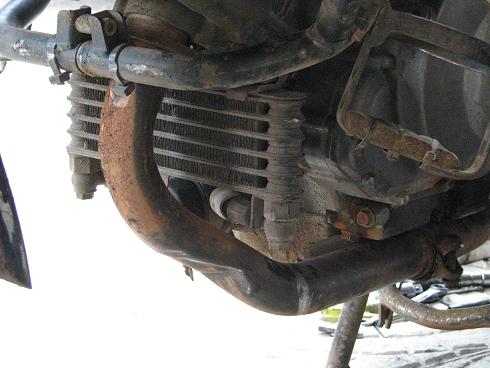
Bent Bit
We were assured that the workshop was excellent and specialised in aluminium welding, upon arrival it was found that they possessed no aluminium welding equipment, as such, nor were any of the staff capable of undertaking this type of welding. After organising the required welding rods Grant took over a corner of the workshop and was given an apprentice and was able to modify a welding machine to do the job. In half a day Piggy was put back together again, none the less still slightly dented.
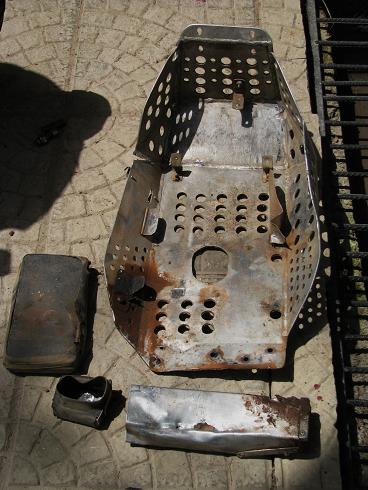
More Bent Bits
During our time at Chambalamba, Mr Marcos explained the difficulties facing Ethiopia in a matter of fact manner. The population is too high for the amount of food the country can produce. In times gone by a fine balance between people and land was maintained. Now with huge amounts of foreign aid pouring into the country, population is growing, land and farm size is not increasing thus families are becoming poorer and poorer, so when there is a drought or ruined crop its effect is devastating.

Potential road kill
Mike and Bonny, our travelling cohorts, were waiting for us in Addis Adiba. After negotiating the ring road, the horses that always seem to be standing in the middle of the highway and the narrow streets of Addis we found them ensconced in the only decent budget option in the city, the Itegue Taitu Hotel. It was here that we discovered Ethiopias wine Aximut and the fire water that was ubiquitously known as Gin.
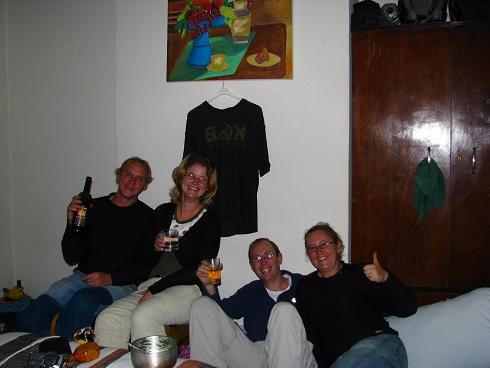
Trouble together again
Addis is a city of history and the museums, cathedrals, buildings and gardens tell the story of a proud nation. Unlike other African nations, Ethiopia was never colonised by another country, European or African. Whilst the Italians attempted to conquer during WWII they failed and left behind a legacy of great pasta and fantastic antique coffee machines.
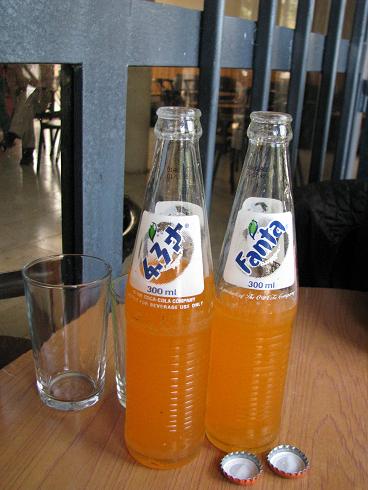
Fanta Fanta
Ethiopia has also been able to preserve their own unique language (Amharic) and unique script, English is definitely a second language and only really used in areas where there are a high number of tourists.
After a week in Addis, Mike and Bonny headed north and we headed east to Harar the ancient walled city close to the Somali border.
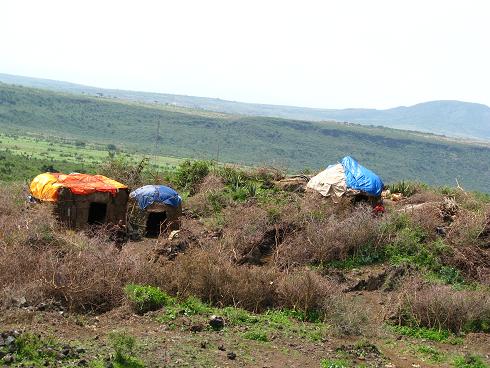
The simple life
Getting there was an adventure in itself.
Mike and Bonny told us that the road was perfect the whole way. And it was. We passed scenes of churches being constructed, nomadic peoples temporary villages, cinder cones from volcanoes long since active and most surprisingly valleys of produce.
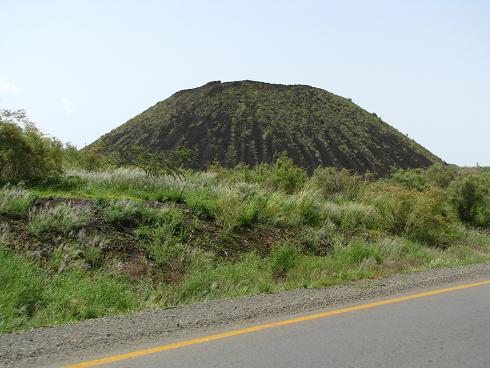
Cinder Cone
At the small town of Asbe Teferi there is a military base over the river crossing, and the bridge that joins the two sides together must not be crossed by anyone on foot or two wheels, motorised or not.
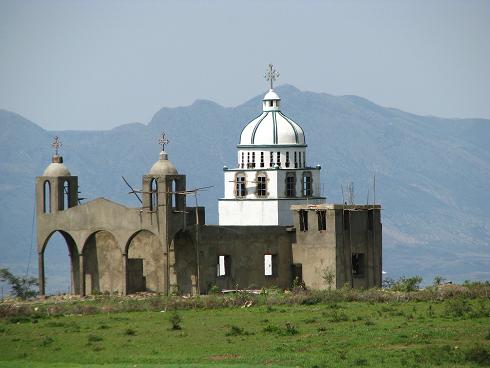
Un - Orthodox Church
As we rode into town, people began chasing us down the road, yelling out for us to stop, we smiled, waved and carried on until a ute (pick up) full of young men pulled us over to explain that we must put the bike onto a truck to pass over the bridge.
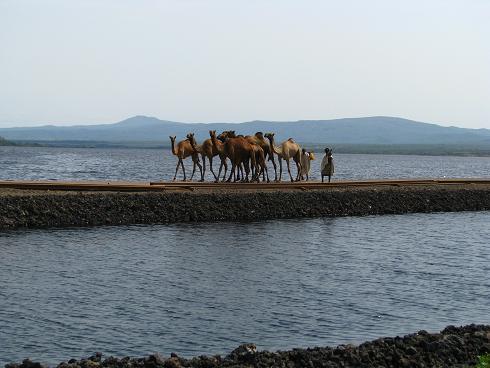
Camel Train to Somalia
Thinking this was some sort of ruse we continued on to the bridge where, being stopped by an army officer, we were indeed sent back to town to get a truck.
He explained the bridge was dangerous. To us the bridge appeared to be newish, looked sound, a mere 200 metres long and not particularly high! We could not understand the hoo-hah.
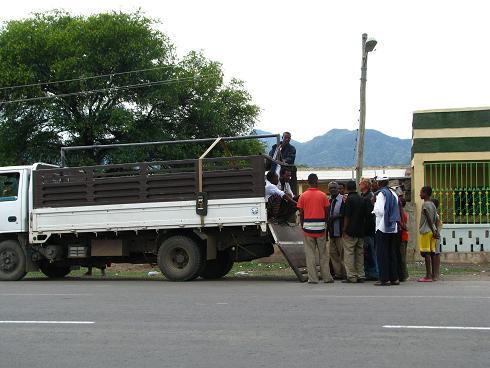
Negotiations
Back at Asbe Teferi negotiations ensued. Prices were set and all was arranged for the following morning.
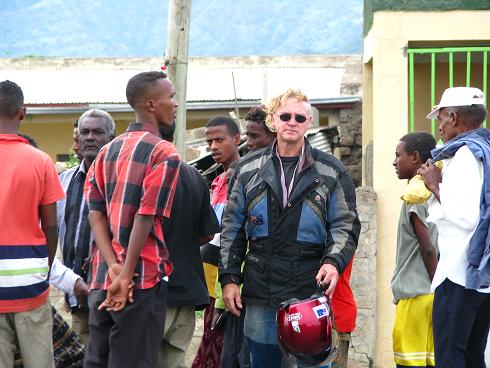
Unhappy outcomes
Arriving at the designated pickup point we expected our mates to arrive with their truck. Plans, it appeared, were not set in concrete, more like shifting sand.
We watched in amazement at random trucks being flagged down, no matter what their load, and being asked to take the bike. Grant was flabbergasted when they stopped a truck that was packed to the brim with bags of cement.
You can just lift it up they argued. Hmmm.
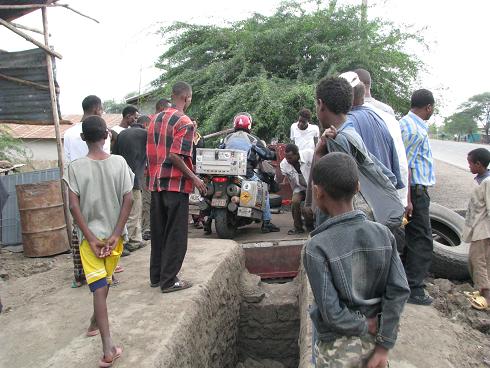
Many hands make expensive process
Eventually an appropriate vehicle was procured. The price was right, everything was set. Our mates gave us a hand to load Piggy, as was half the town.
Once Piggy was securely (for the want of a better word as in reality she was precariously balancing with Grant astride holding her up on the slippery metal truck tray floor) in place and the tailgate locked everyone wanted their share of the cash because they helped by watching with concern. We shelled out wads of Birr, the truck stuttered to life, jolted into first gear, negotiated its way onto the main road then took off like a rocket.
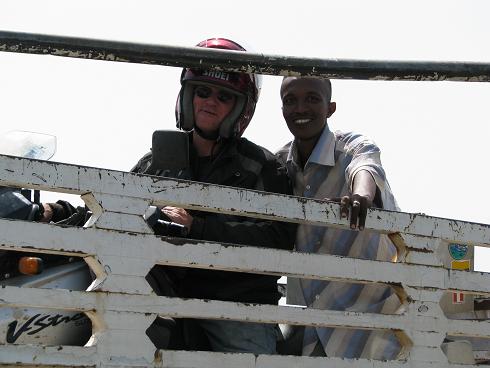
Hmmm is this wise
Jerking and shaking us about for a few minutes, we crossed the infamously dangerous bridge and were presently let off on the other side. Our speedy truck driver backed up against a mound of earth works, lowered the tailgate. Rocks were precariously placed between the truck and hillock, fashioning a kind of temporary bridge for Grant to roll the loaded bike across (a somewhat terrifying ordeal). All that was left to do now was to ride down the slope , dish out more cash for the new extra fees involved (such as building the rock bridge) and drive off into the, now, afternoon sun to Harar.
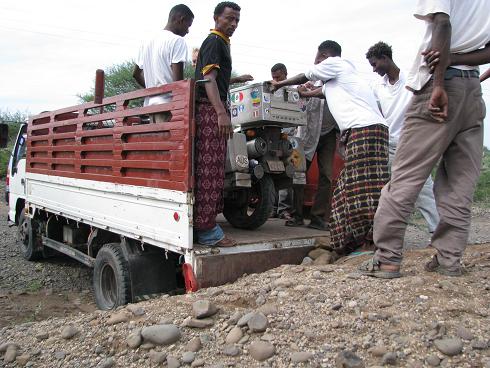
'Just ride it off....'
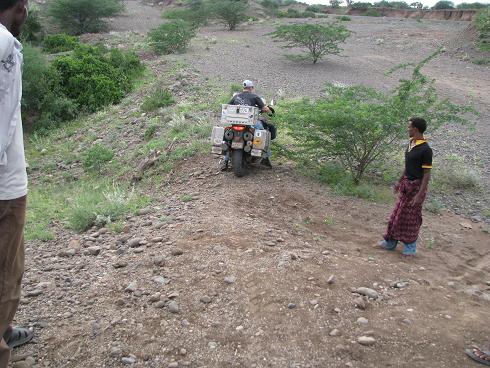
'....and down the hill'
Just think, the same procedure had to be undertaken again on the return trip!
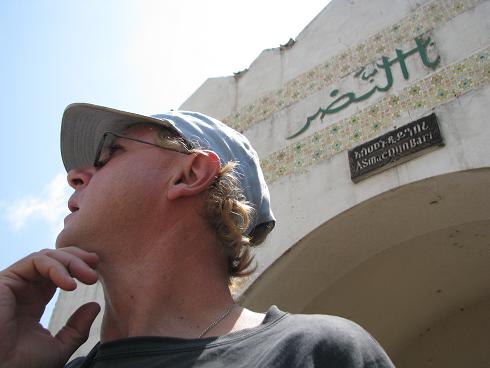
'Where the hell is the damned wall gate?'
Harar is a very exciting town, famed for being an ancient market place for the camel herders of Somalia and a resting place for Swahili merchants travelling from the coast to inland Africa. Today it is a 50% Christian and 50% Muslim city, offering a glimpse of ancient Ethiopia to the tourist. Some traditions, like the feeding of the wild hyenas at dusk have been performed by the same families for generations.
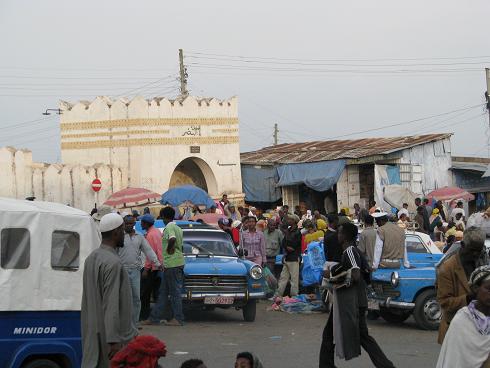
Busy times - Harar
With 130 odd narrow cobbled winding streets it is reminiscent of Zanzibar, however somewhat more rustic and less restored.
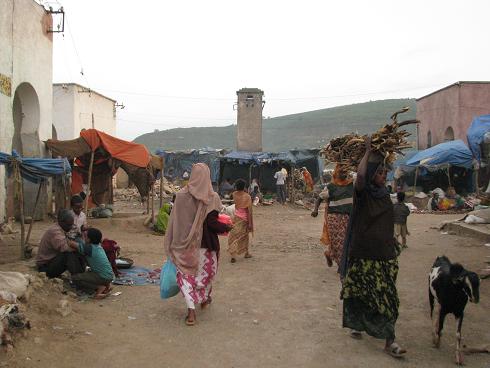
Muslim Markets
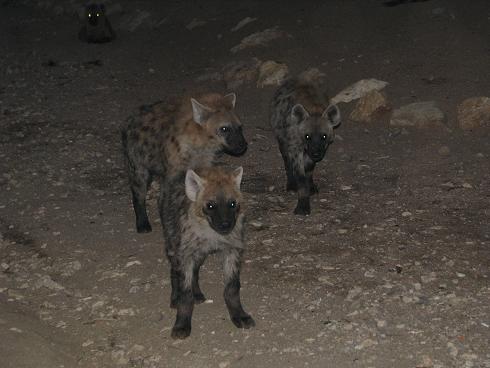
Hyenas
The walls of the city had small openings built along its base, no bigger than a doggy door. Our tour guide explained that in ancient times these openings were built by the locals to be used by hyenas to come in and eat the rubbish from the streets of the city at night. Certain families ensured the hyena would come by providing them with some food each evening at dusk, a treat of a little camel meat. Today this tradition remains. As a tourist you can go to the outside of the city where the hyena feeder calls his wild animals by name, feeds them meat from a big cane basket. These creatures could kill you in their natural environment, however once a day they are eerily placid and will take food from your hand.
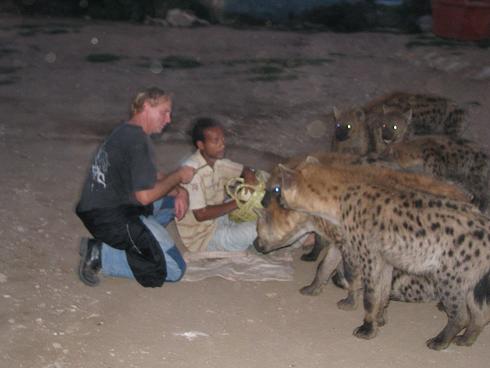
Grant getting in on the action
Whilst in Harar we had news that the Global Economic Crisis, affecting so many people worldwide was now impacting heavily on us. We had to make a decision to bumble on and hope for the best or return to Australia. This time, unlike in South Africa, we chose to ride on the side of prudency returning to Australia.
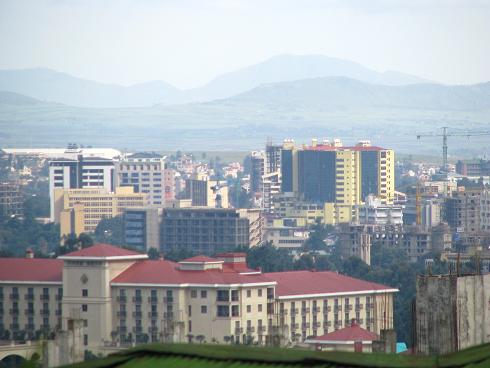
Addis
Many factors impacted on us including the thought of being caught out in the middle of the Sudan with no access to any money. We too had become a little jaded and definitely tired. Africa had been a hard continent to travel on. In as much as we love Africa we hate her equally passionately. Constant begging, eternal poverty, corrupt governments, the quandary of to give aid or not to give all impacted our decision. Mostly though, it was financial.
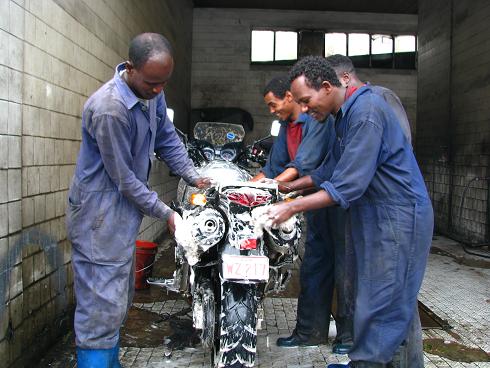
Piggy takes a bubble bath
We left the final decision to the universe. If it was easy to arrange, no hiccups then it must be. Arriving back in Addis on the Sunday and flying out, with Piggy in tow, on the Wednesday, you could not ask for an easier exit than that.
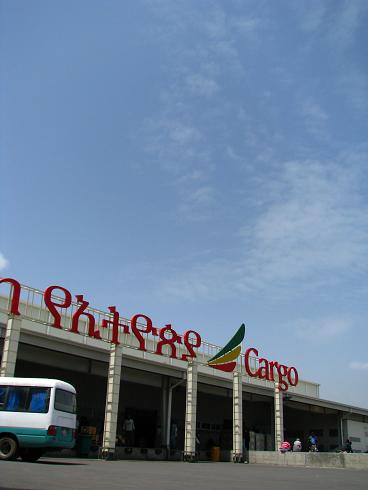
Cargo Terminal
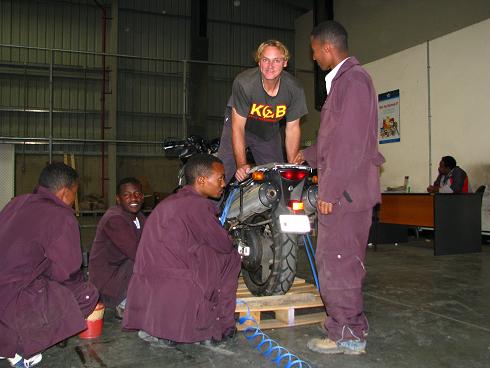
Strapping down Piggy
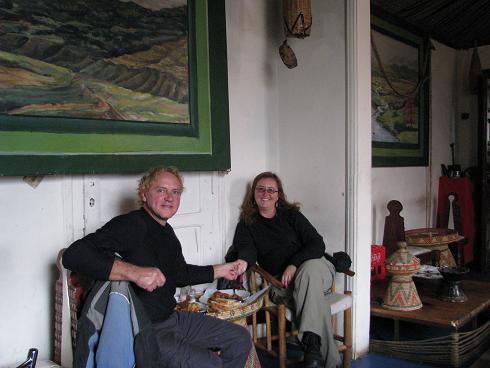
Last dinner in Africa
